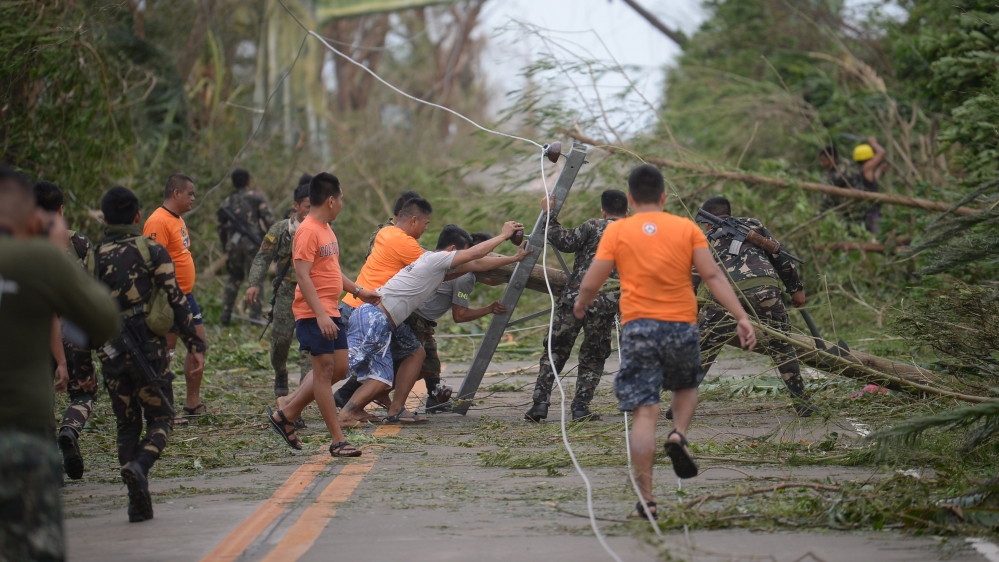Typhoon Mangkhut kills 12 in Philippines, heads to southern China
At least 12 people have been killed as Typhoon Mangkhut tore across northern Philippines with destructive winds and heavy rain, before heading towards Hong Kong and southern China.
The victims died mostly in landslides and houses that got pummeled by the storm’s fierce winds and rain on Saturday, according to presidential adviser Francis Tolentino, who is the government’s main coordinator for disaster response.
Among the dead were an infant and a two-year-old child who died with their parents after the couple refused to immediately evacuate from their high-risk community in Nueva Vizcaya province, Tolentino said.
At least two other people were missing, he said, adding that the death toll could climb to at least 16 once other casualty reports were verified.
“My appeal is that we need to heed the advice of the authorities. Stay indoors,” said Tolentino.
 |
| Rescue workers said they expect “substantial damage” in the Philippines. [Ted Aljibe/AFP] |
|
WATCH: Philippines – Disaster Capitalism, Inc (26:00) |
Known locally as Ompong, Mangkhut is the most ferocious storm to hit the Philippines this year.
It slammed ashore before dawn on Saturday in Cagayan province on the northeastern tip of Luzon island.
At one point, it hit gusts of 305km/h before it left the Philippines and moved across South China Sea with reduced winds.
“It felt like the end of the world”, said Bebeth Saquing from her home on Luzon. “I did not sleep,” she told AFP news agency.
‘Life and death situation’
About 87,000 people were evacuated from high-risk areas of the Philippines.
Officials advised them not to return home until the lingering danger had passed.
“It’s still a life and death situation,” Defence Secretary Delfin Lorenzana told The Associated Press news agency by phone, citing past drownings in swollen rivers in mountain provinces after storms had passed.
 |
| Typhoon Mangkhut left a trail of battered homes, landslides and fallen trees in its wake. [Ted Aljibe/AFP] |
Al Jazeera’s Jamela Alindogan, reporting from Cagayan province, said the storm cut off power and communications in the city of Tuguegarao and devastated rural communities in the region.
“We saw homes and farmland destroyed throughout rural communities. Access into these areas is difficult, which means aid may be slow to arrive, too,” she said.
“They barely had much before the typhoon, and now they have even less.”
Julie Rosales, owner of a cafe in the town of Baggao, said the storm “really hurt” her family.
“Everything happened so fast and now my business is gone,” she told Al Jazeera.
We ventured out and drove past rural communities. One of the many areas that we saw… the devastation in the town of Bagao. No reported casualties so far, but quite a number of civilians lost their homes. @AJEnglish @tedregencia @AJENews #Mangkhut pic.twitter.com/vyjuJNPIJK
— Jamela Alindogan (@jamelaaisha) September 15, 2018
Mangkhut is the 15th storm to batter the Philippines this year.
More than five million people were at risk from the storm, and authorities are taking extra precautions as they draw comparisons with Typhoon Haiyan, which devastated central areas of the archipelago in 2013, and killed 6,300 people.
In Hong Kong, authorities are expected to raise the second strongest typhoon signal between 11pm and 2am local time (15:00 – 18:00 GMT).
Hong Kong’s flag carrier Cathay Pacific said all flights from the city would be cancelled on Sunday.
In nearby Fujian province in China, 51,000 people were evacuated from fishing boats and around 11,000 vessels returned to port on Saturday morning.
China’s National Meteorological Center issued an alert saying Mangkhut would make landfall somewhere on the coast in Guangdong province on Sunday afternoon or evening.
Ferry services in the Qiongzhou Strait in southern China were halted on Saturday and helicopters and tugboats were dispatched to Guangdong to transfer offshore workers to safety and warn ships about the typhoon, China’s official Xinhua News Agency reported.
SOURCE: Al Jazeera and news agencies




